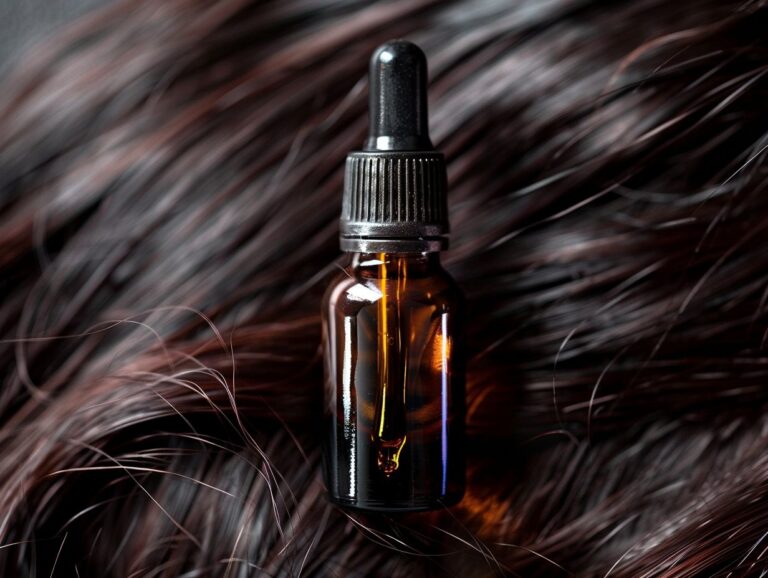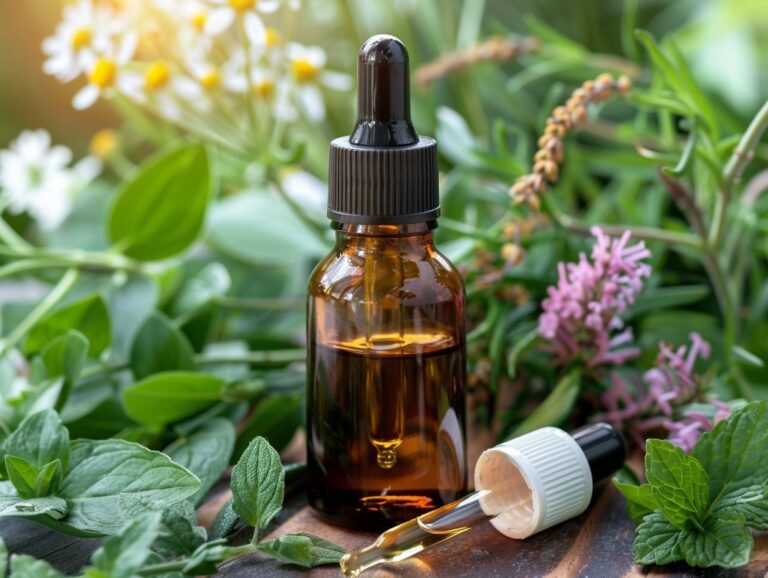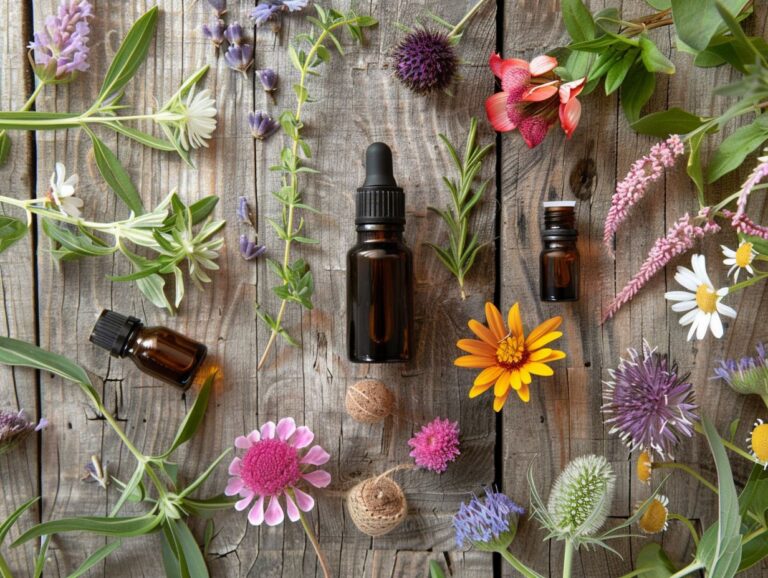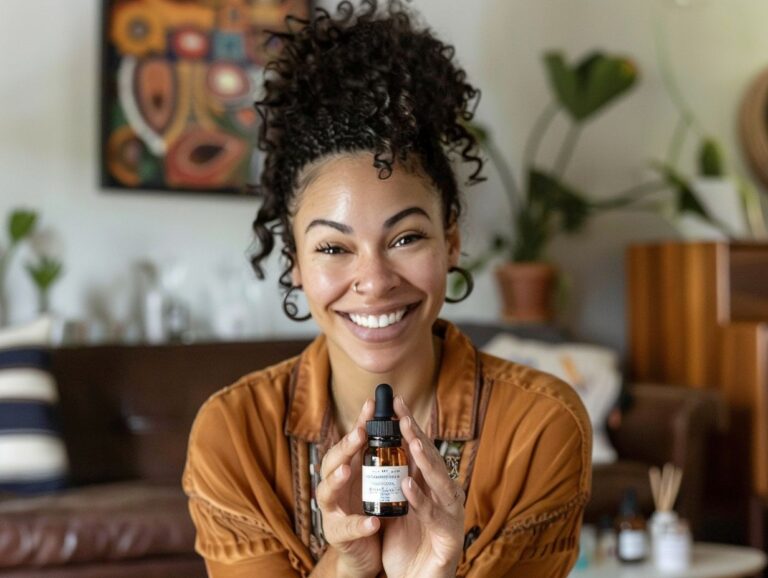Do Essential Oils Contain Pesticides
Essential oils have gained popularity for their various uses, from aromatherapy to skincare and cleaning products.
Have you ever wondered if these oils contain pesticides?
We explore what pesticides are, how they are used in essential oil production, and the potential risks of using oils with pesticides.
Discover tips on choosing non-toxic essential oils and explore alternative options for those looking to avoid pesticides.
Let’s learn more about essential oils and pesticides.
Key Takeaways:
What Are Essential Oils?
Essential oils are natural aromatic compounds obtained from plants through processes like distillation. They capture the plants’ aroma, flavor, and chemical composition.
These oils come from various organic sources such as flowers, leaves, stems, roots, and fruits, each offering distinct properties and benefits. In contrast, conventional essential oils may derive from synthetic compounds.
The extraction process typically involves distillation, where steam passes through the plant material, carrying its volatile compounds. The collected steam is then cooled and separated, resulting in a concentrated form of the essential oil. It is crucial to note that essential oils are pure essences extracted directly from nature, providing a natural remedy for aromatherapy, skincare, and overall well-being.
How Are Essential Oils Made?
Essential oils are produced through various methods, with steam distillation being a common technique. The quality of the oils can be influenced by factors such as the plant’s geographical location and provenance.
Steam distillation involves the use of steam to extract the essential oils from the plant material. Water and steam are passed through the botanicals, causing the glands containing the oils to burst. The steam then carries the volatile compounds through a cooling system, where they condense back into liquid form. This method is favored for its gentleness and ability to preserve the delicate aromatic compounds.
It is crucial to note that the geographical origins of plants play a significant role in the chemical composition of the extracted oils. Different regions can offer varying soil compositions, climates, and altitudes that directly impact the plants’ growth and subsequently alter the oil’s aroma and therapeutic properties.
What Are the Uses of Essential Oils?
Essential oils have a wide range of uses, from aromatherapy to skincare and cleaning products. Their therapeutic properties make them popular for various applications.
One of the most prominent uses of essential oils is in aromatherapy, where the scent of the oils can positively affect mood and promote relaxation. They are also extensively used in skincare due to their natural healing and nourishing properties, aiding in the treatment of various skin conditions. Along with these applications, essential oils are commonly included in cleaning products for their antibacterial and antifungal properties, providing a natural alternative to harsh chemicals.
Aromatherapy
Aromatherapy involves the use of essential oils for holistic healing and well-being. The quality standards of these oils are crucial for ensuring their therapeutic efficacy.
The effectiveness of essential oils in aromatherapy lies in their ability to interact with the body through the olfactory system, triggering various physiological responses. When selecting oils for aromatherapeutic purposes, it is important to consider factors such as purity, authenticity, and extraction methods, as these directly influence the potency and safety of the oil.
Adhering to established quality standards ensures that the oils are free from contaminants and adulterants, maximizing their therapeutic potential.
Skincare
Essential oils are commonly used in skincare products due to their natural properties. Organic oils are preferred for their purity and are often sourced from reputable distillers.
Organic oils, such as jojoba, rosehip, and argan oil, offer numerous benefits for the skin. They contain essential fatty acids, antioxidants, and vitamins that nourish and hydrate the skin, promoting a healthy complexion.
Choosing oils from trustworthy distillers is crucial to ensure the quality and effectiveness of the product. Reputable distillers follow strict processes that preserve the integrity of the oils, free from contaminants and additives that could irritate the skin.
Cleaning Products
Essential oils are utilized in natural cleaning products as safer alternatives to toxic chemicals. Their natural sources reduce the risk of contamination and environmental impact.
Incorporating essential oils into eco-friendly cleaning products not only provides a non-toxic cleaning solution but also offers various aromatherapy benefits. These oils, extracted from plants, possess natural antibacterial and antifungal properties, making them effective in sanitizing surfaces without harming the environment. By replacing harsh chemicals with essential oils, the carbon footprint of cleaning products is significantly reduced, contributing to a more sustainable lifestyle. Essential oils add pleasant scents to the cleaning process, transforming it into a more enjoyable and holistic experience.
Do Essential Oils Contain Pesticides?

Concerns exist about pesticide residues in essential oils, especially those not backed by organic certification.
The presence of pesticides in essential oils poses potential health risks, as these chemicals can linger and accumulate in the body over time. Consumers increasingly seek organic certification when purchasing essential oils, as it ensures the products are free from harmful synthetic pesticides.
Residue analysis plays a vital role in maintaining the quality and safety of essential oils, as it allows for the detection and quantification of pesticide residues. Through meticulous testing and adherence to strict standards, producers can offer reassurance to consumers that their essential oils are pure and safe for use.
What Are Pesticides?
Pesticides are substances used to control pests in agricultural practices. They can be synthetic or derived from natural methods, impacting soil quality.
The use of synthetic pesticides has been a common practice in agriculture due to their effectiveness in eliminating pests quickly. Their widespread use has raised concerns about the potential negative impacts on the environment, including soil contamination and loss of biodiversity. On the other hand, natural pesticides are an alternative option that can help reduce the environmental footprint of pest management. These methods usually involve using plant extracts or beneficial insects to control pest populations.
How Are Pesticides Used in Essential Oils Production?
Pesticides are sometimes used in farming practices to protect crops, which can lead to contamination of essential oils during production. Synthetic pesticides pose risks to oil purity.
This contamination may occur due to the residues left behind on the plants treated with synthetic pesticides. When essential oils are extracted from these plants, the pesticides can seep into the oils, compromising their purity and potentially affecting their therapeutic qualities. Synthetic pesticides may also disrupt the natural balance of the plant’s biochemical composition, altering the aroma and properties of the essential oil produced.
What Are the Risks of Using Essential Oils with Pesticides?
The utilization of essential oils containing pesticides can pose health risks, including skin irritation, respiratory issues, and hormonal disruptions. Careful selection is crucial to avoid these concerns.
When essential oils are contaminated with pesticides, the chemicals can seep into the skin upon application, leading to skin irritation and even allergic reactions. Inhaling these oils can also result in respiratory problems, exacerbating conditions like asthma or causing breathing difficulties. The hormonal disruptions caused by the presence of pesticides in essential oils can have long-term effects on one’s endocrine system, potentially impacting fertility and overall well-being.
Skin Irritation and Allergies
Skin irritation and allergies can result from using essential oils with pesticide residues. It is essential to prioritize safety by selecting oils free from these contaminants.
When essential oils are not properly sourced and tested, they can easily contain pesticide residues that may trigger adverse skin reactions. These reactions can manifest as redness, itching, burning sensations, or even more severe allergic responses.
Individuals with sensitive skin are particularly at risk, as their skin may react more intensely to these chemical contaminants. To avoid these risks, consumers should thoroughly research suppliers and opt for oils that are certified organic or have undergone rigorous testing to ensure the absence of pesticides.
Respiratory Problems
Inhaling essential oils with pesticide residues can lead to respiratory problems and breathing difficulties.
Quality standards play a vital role in ensuring the purity of essential oils, which directly impacts respiratory safety. When pesticides are present in essential oils, they can irritate the respiratory tract, trigger allergies, and even lead to more severe conditions such as asthma or bronchitis.
To safeguard respiratory health, it is imperative to opt for oils that have undergone rigorous testing to guarantee they are free from harmful contaminants. By selecting oils from reputable sources that adhere to quality guidelines, individuals can enjoy the aromatic benefits without risking their respiratory well-being.
Hormonal Disruption
Pesticides in essential oils can disrupt hormonal balance, leading to potential health issues.
These pesticides, which can include synthetic chemicals and toxins, have the potential to interfere with the endocrine system by mimicking or blocking hormone signals. This disruption can manifest in various health problems such as reproductive issues, thyroid dysfunction, and even increased risk of certain cancers. Choosing organic essential oils ensures that these harmful pesticides are not present, reducing the risk of hormonal disturbances and promoting overall well-being.
How to Choose Pesticide-Free Essential Oils?

Selecting pesticide-free essential oils involves looking for organic certification, researching production methods, and checking for third-party testing. These steps ensure the oils’ quality and safety.
When choosing essential oils, seeking organic certification is crucial as it signifies that the oils have been produced without harmful pesticides.
Understanding different production methods such as steam distillation or cold pressing can help you determine the quality and purity of the oils.
Additionally, third-party testing is essential to verify the potency, authenticity, and safety of the oils, ensuring that they meet the required standards.
Look for Organic Certification
Organic certification validates essential oils’ adherence to strict quality standards.
Checking for certifications like USDA Organic can assure consumers of the oils’ purity. This certification ensures that the essential oils have been produced without synthetic additives, pesticides, or genetically modified organisms, following a set of stringent guidelines that prioritize environmentally friendly practices.
By choosing organic certified essential oils, consumers support sustainable farming methods that promote the health of both people and the planet. Such certifications also provide transparency in the sourcing and processing of the oils, offering peace of mind to buyers concerned about the authenticity and purity of the products.
Research the Brand’s Production Methods
Understanding a brand’s production methods for essential oils is essential. Brands employing natural farming practices are more likely to offer pesticide-free oils.
By looking into a brand’s approach to sourcing and extracting essential oils, consumers can gain insight into whether the final products are free from harmful chemicals.
Natural farming practices prioritize sustainability by avoiding synthetic pesticides and fertilizers, aligning with the growing demand for organic and eco-friendly products.
- Researching how essential oil brands manage their agricultural processes is crucial in ensuring that the oils are produced in an environmentally conscious and health-conscious manner.
- Educating oneself on the methods used in the cultivation and extraction of essential oils can help consumers make informed choices and support brands committed to sustainable practices.
Check for Third-Party Testing
Third-party testing of essential oils ensures independent verification of their safety and quality. It provides consumers with reliable information regarding potential pesticide residues.
By subjecting essential oils to third-party testing, manufacturers demonstrate their commitment to delivering products of high standards. These tests are conducted by impartial laboratories that specialize in analyzing the composition of various substances. Through rigorous testing procedures, these labs can detect the presence of harmful chemicals such as pesticides in essential oils. This transparency not only benefits consumers by ensuring the purity of the products they are using but also adds a layer of accountability to the production process. In an industry where quality can vary greatly, third-party testing stands as a crucial step towards building trust between producers and consumers.
What Are the Alternatives to Essential Oils?
In lieu of essential oils, alternatives like fresh or dried herbs, infused oils, and fragrance-free products can offer similar benefits without concerns of pesticide contamination.
In terms of using fresh or dried herbs as an alternative to essential oils, one can easily harness the natural fragrances and therapeutic properties present in nature. Popular choices include lavender for its calming effect, peppermint for its energizing qualities, and chamomile for its soothing scent.
Infused oils, created by steeping herbs in carrier oils like jojoba or almond oil, are another excellent option that not only adds fragrance but also imparts the healing properties of the herbs.
On the other hand, fragrance-free products cater to individuals with sensitivities and allergies, offering a gentle yet effective solution for personal care needs.
Fresh or Dried Herbs
Fresh or dried herbs are natural alternatives to essential oils. They provide aromatic and therapeutic benefits sourced directly from plants.
Herbs such as lavender, mint, and rosemary can be used to create herbal infusions, bath salts, or DIY skincare products, offering a more affordable and accessible option compared to essential oils. The process of extracting oils from herbs involves steeping them in carrier oils or alcohol to capture their beneficial properties. These herbal remedies are versatile and can be used in aromatherapy, massage oils, or as natural air fresheners.
Infused Oils
Infused oils offer a natural-based option to essential oils. They undergo infusion processes that retain plant essences and maintain quality standards.
One of the common methods used to make infused oils is the cold infusion technique, where the plant material is soaked in a carrier oil for an extended period to extract its beneficial properties. On the other hand, the heat infusion method involves gently heating the plant material with the carrier oil to speed up the extraction process. These meticulous methods ensure that the infused oils contain the desired aroma and therapeutic benefits of the plants they are derived from.
Fragrance-Free Products

By opting for fragrance-free products, consumers can confidently avoid potential risks associated with essential oil cross-contamination, especially in skincare and sensitive cosmetic applications.
Fragrance-free alternatives prioritize purity and safety
, providing individuals with a reassuring choice when it comes to personal care products. Not only do these products cater to individuals with allergies or sensitivities, but they also support a healthier environment by utilizing clean and natural ingredients. Embracing fragrance-free options not only enhances personal well-being but also promotes a cleaner and more sustainable approach to daily routines.
Frequently Asked Questions
1. Do essential oils contain pesticides?
Yes, essential oils can contain pesticides if they are not properly sourced and extracted. This can happen if the plants used to make the oils were treated with pesticides during cultivation.
2. How can I ensure that the essential oils I purchase are free of pesticides?
Look for essential oils that are labeled as “organic” or “certified organic.” These oils are made from plants that were grown without the use of pesticides or other harmful chemicals.
3. Are there any essential oils that are more likely to contain pesticides?
Generally, oils from plants that are more prone to pests, such as citrus oils, may have a higher likelihood of containing pesticides. It is important to do your research and purchase from reputable brands that prioritize organic and sustainable sourcing.
4. Can pesticides in essential oils be harmful to my health?
Pesticides in small amounts may not have immediate harmful effects, but repeated exposure to them can have negative impacts on your health. It is always best to choose organic essential oils to minimize any potential risks.
5. What are the potential risks of using essential oils that contain pesticides?
Pesticides can have adverse effects on your respiratory system, skin, and overall health. Additionally, using essential oils with pesticides may also reduce the therapeutic benefits of the oils.
6. Can I test essential oils for pesticides at home?
No, it is not possible to test for pesticides in essential oils at home. It requires specialized equipment and testing methods that can only be done by certified labs. Your best option is to purchase oils from trusted sources that follow strict quality control measures.








4 Comments